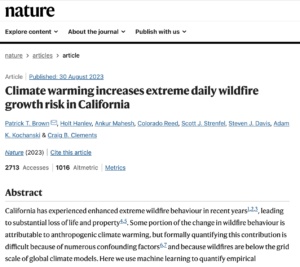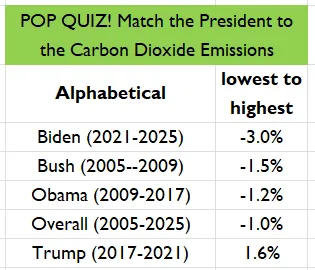https://www.thefp.com/p/i-overhyped-climate-change-to-get-published
September 5, 2023
I Left Out the Full Truth to Get My Climate Change Paper Published
I just got published in Nature because I stuck to a narrative I knew the editors would like. That’s not the way science should work.
September 5, 2023
I am a climate scientist. And while climate change is an important factor affecting wildfires over many parts of the world, it isn’t close to the only factor that deserves our sole focus.
So why does the press focus so intently on climate change as the root cause? Perhaps for the same reasons I just did in an academic paper about wildfires in Nature, one of the world’s most prestigious journals: it fits a simple storyline that rewards the person telling it.
The paper I just published—“Climate warming increases extreme daily wildfire growth risk in California”—focuses exclusively on how climate change has affected extreme wildfire behavior. I knew not to try to quantify key aspects other than climate change in my research because it would dilute the story that prestigious journals like Nature and its rival, Science, want to tell.
This matters because it is critically important for scientists to be published in high-profile journals; in many ways, they are the gatekeepers for career success in academia. And the editors of these journals have made it abundantly clear, both by what they publish and what they reject, that they want climate papers that support certain preapproved narratives—even when those narratives come at the expense of broader knowledge for society.
To put it bluntly, climate science has become less about understanding the complexities of the world and more about serving as a kind of Cassandra, urgently warning the public about the dangers of climate change. However understandable this instinct may be, it distorts a great deal of climate science research, misinforms the public, and most importantly, makes practical solutions more difficult to achieve.
#
Key excerpts:
Climate Scientist Patrick T Brown – September 5, 2023 – I am a climate scientist. And while climate change is an important factor affecting wildfires over many parts of the world, it isn’t close to the only factor that deserves our sole focus. So why does the press focus so intently on climate change as the root cause? Perhaps for the same reasons I just did in an academic paper about wildfires in Nature, one of the world’s most prestigious journals: it fits a simple storyline that rewards the person telling it.
The paper I just published—“Climate warming increases extreme daily wildfire growth risk in California”—focuses exclusively on how climate change has affected extreme wildfire behavior. I knew not to try to quantify key aspects other than climate change in my research because it would dilute the story that prestigious journals like Nature and its rival, Science, want to tell. …
To put it bluntly, climate science has become less about understanding the complexities of the world and more about serving as a kind of Cassandra, urgently warning the public about the dangers of climate change. However understandable this instinct may be, it distorts a great deal of climate science research, misinforms the public, and most importantly, makes practical solutions more difficult to achieve.



